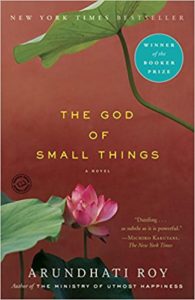 I know I am in the minority for this much-beloved book. It just didn’t work for me.
I know I am in the minority for this much-beloved book. It just didn’t work for me.
Set in India in the 1970’s and beyond, a brother and sister, twins in an affluent family, seek love in life, as we all do. The twins’ mother has a forbidden affair with an untouchable servant who is also a communist. The tryst is discovered to great scandal and the twins are pressured into testifying it was rape. The servant is beaten to death by police. The mother dies alone, crazy, and impoverished, while the twins never get over the emotional scar caused by their lie.
The novel won the Booker Prize in 1997, mainly on the strength of its lush (I would say florid) writing, which is truly poetic, so much so that the fire hose of lyrical description overwhelms the story and all the characters, making the novel into one long slog of interesting, but ultimately pointless exercise of language.
There were so many characters in the extended family, each with multiple names and nicknames, I would have needed a kinship diagram to keep them all straight, which I didn’t, and couldn’t. I realize most people are deeply fascinated by kinship relations but I am not. Family life and its squabbles, to me, are boring as dirt.
Most characters came across as quirky but shallow without well-developed motivation. Love, supposedly the driving force of the story, is merely declared by the narrator. I never had an organic sense of it. Why did the mother have sex with the servant? Lonely, I guess, but is that sufficient motivation to ignore the big, obvious prohibition? I wouldn’t think so, but at the end of the novel the twins even throw the incest taboo to the winds. Middle finger to social mores!
The big dramatic events of the story are few and overwrought. Yes, the caste system is horribly unjust, but socially forbidden love is not really a fresh topic. Since I never was engaged with the characters, the micro-dramas of everyday life that filled the pages, engineered and narrated by the omniscient God of Small Things, did not hold my attention.
I did enjoy passages of vividly rich, sensory detail, of landscape, weather, food, clothing, vehicles and buildings. Good psychological description was hard to come by. Description of body functions and products, from odors to vomit, seemed excessive and were uninteresting to me, but perhaps that’s a cultural bias. In any case, fine description is the strength of the book.
I enjoy prose poetry and read it often, but three hundred pages of over-writing left me feeling this was mainly writing for the sake of writing, to the neglect of compelling story.
